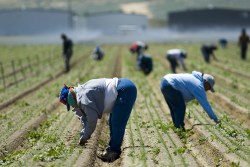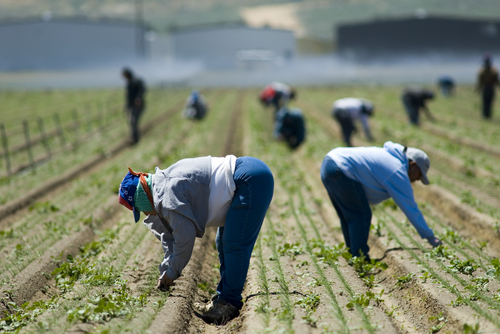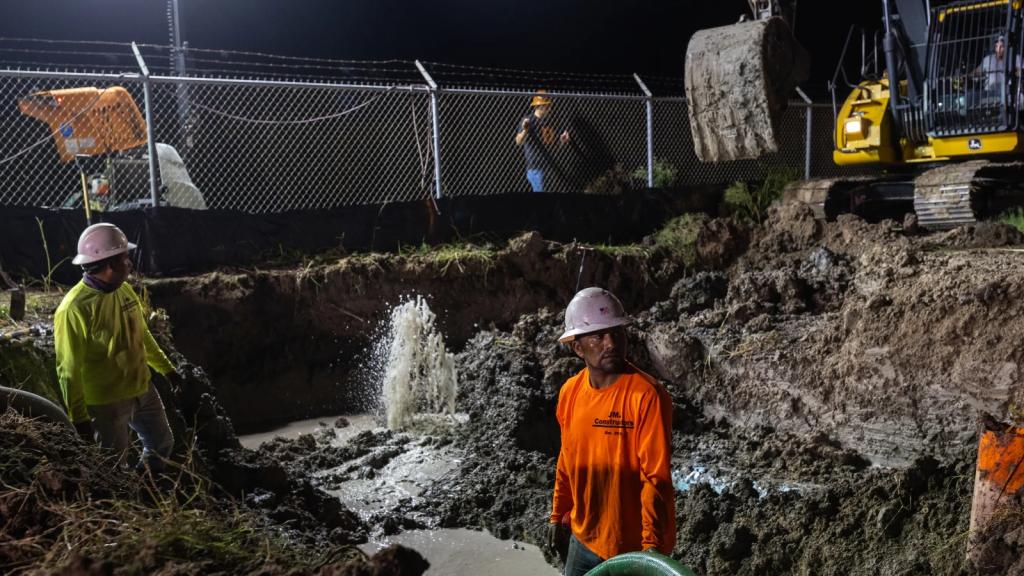
Richard Thornton / Shutterstock.comFarmworkers weeding in the field by hand, San Joaquin Valley, Calif.
Farm owners and farmworkers may not always see eye to eye, but there’s one thing on which they do — strongly — agree: We need change to our approach to immigration.
After years of ignoring the issue, Washington, D.C., has started to pay attention and may just be ready to act. President Obama has named immigration reform a top priority for his second term, House Speaker John Boehner feels “confident” that Republicans will agree to a comprehensive immigration bill, and if Obama’s expectations are met, we may see a proposal come out of Capitol Hill soon after his Jan. 20 inauguration.
Farmworkers, exempt from some of the nation’s most basic labor laws, like minimum wage and overtime pay, work in one of the most hazardous occupations in the country. They face risks from strenuous physical labor, often for long hours in extremely hot climates; pesticide exposure; and their work often involves dangerous equipment, often without proper training or safety measures.
Those are standard complaints, but because most farmworkers are undocumented — estimates range from about 50 percent to more than 80 percent in the U.S. — or in some cases employed through a guest worker program that doesn’t get much government oversight [PDF], they are doubly vulnerable. Without immigration status, they have little or no leverage to speak out or fight against inhumane working conditions, and often lack any avenue for doing so.
Farmers, meanwhile, want reform because the current system for agricultural employment is failing them. As the anti-immigration climate has intensified over the last few years — with programs like E-Verify, an internet-based system that lets employers do a background check on their employees — farmers have felt threatened because undocumented workers are a population they depend on. The result is tangible; more and more farmers are complaining about a lack of workers.
“One thing that I’ve been told consistently by growers this year was that if you needed 30 people, you had 25. If you needed five crews, you had four,” said Bryan Little of the California Farm Bureau Federation. “The result of that is you wind up losing productivity.”
That affects farmers’ profits, but the long-term implications have some concerned about larger, national issues like food security. In a recent California Farm Bureau survey, “Sixty-one percent of the nearly 800 growers surveyed said they were shorthanded by a little or a lot this year.”
“I talk to growers who are saying, ‘We are triaging. We don’t have enough workers to harvest all five fields that are ripe this week. We picked out the two or three that are going to bring the most profit and we ditched the others,’” said Frank Gasperini, president of the National Council of Agricultural Employers (NCAE). He added that more and more farmers are choosing to grow crops based on what they can get the labor for, and U.S. food production is suffering as a result. “Food costs will continue to go up, but more importantly, it means that we will continue to see food production acres going to other countries.”
Little agreed, saying he’s seeing a “notable” percentage of agriculture move to Mexico, where “you’re starting to see significant investment in the kind of infrastructure that’s necessary to support things like growing peppers and lettuce and strawberries.”
So what kind of changes do farmers and farm workers want to see? And what changes are we likely to see in whatever immigration reform package comes out of D.C. in the coming year?
Just about everyone agrees that effective, comprehensive immigration reform can’t just change the system going forward; it has to address the immigration status of undocumented workers already in the country. So the real question is: What status will those workers be given?
Farmworkers and their advocates want to see workers given permanent legal status. This would give farmworkers more rights, as well as more dignity by recognizing their place in the U.S. and the role they play in our economy and our food system. Some industry groups, however, are pushing for solutions like the American Farm Bureau Federation’s proposed an “ag card” program, or a temporary work visa.
Such measures would provide a stopgap for farmers looking for more workers in the short term, but they are not much different than the guest worker programs that already exist and are riddled with problems — from inefficiency to worker abuse.
“We vigorously oppose those kinds of guest worker programs,” said Bruce Goldstein, president of the advocacy group Farmworker Justice.
In the coming months, he predicts “a public policy battle over whether this country will go down the path of becoming a nation of guest workers or will retain its history into the future as a nation of immigrants.”
Plus, advocates say the ag card program wouldn’t solve the fundamental problems faced by migrant farmworkers.
“The biggest issue with employer-based programs is that [workers] don’t have guaranteed rights,” says Lalo Zavala, chief executive officer of MAFO, a partnership of farmworker organizations nationwide. Zavala points to the fact that many workers are bussed to remote locations, where they become completely reliant on their employers for basic needs like food, water, and housing, and an internal economy that uses tokens rather than dollars.
While that doesn’t have to mean a raw deal for the worker, reality has shown that’s often exactly what it means. Under an ag card-type program, it’s very possible that workers would be vulnerable to neglect, price gauging, and unsanitary conditions.
Beyond the immigration status of current workers, the discussion of how to reform immigration policies to improve agriculture gets pretty sticky. Farmworkers and advocacy groups want to see basic protections for workers, while many large farms and employers are less interested in providing those protections.
Opponents of tightening labor laws for agricultural workers argue, among other things, that raising wages and providing overtime or workers’ compensation to farmworkers will be costly.
But, Goldstein points out, “In most of the states where there’s a lot of farmworkers, like California and Washington state, there is workers’ compensation coverage and they are very successful agribusiness states. There’s no excuse for other states to deprive farmworkers of wages and medical care when they are injured on the job.”
Overall, what Farmworker Justice and other groups want to see is, as Goldstein put it, “modernization of labor relations in agriculture and an end to the discrimination of labor laws against farmworkers based on their occupation.”
How government officials will address these issues when they work on immigration reform is still a huge question mark. As the Farm Bureau’s Kristi Boswell says, “There’s a lot of rumors and people talking about reform … but at the end of the day, it’s what the whole package is going to look like and what can actually pass politically. And I think we’re a long way from figuring that out.”




